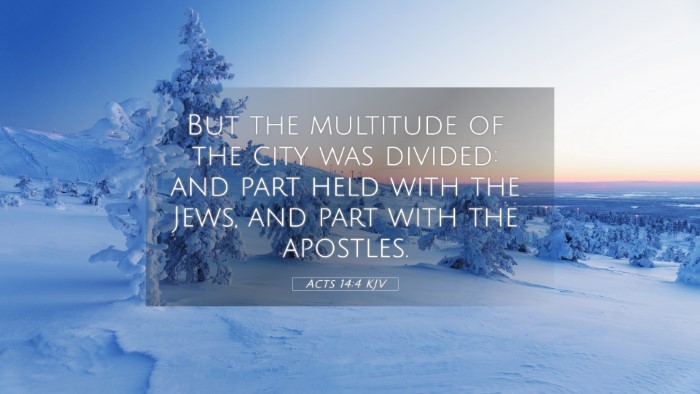Understanding Acts 14:4
Acts 14:4 states: "But the multitude of the city was divided: and part held with the Jews, and part with the apostles." This verse reveals the dynamic response to the apostles' ministry in a diverse community. Here is an insightful analysis using various public domain commentaries.
Commentary Insights
Matthew Henry's Commentary
Matthew Henry emphasizes the division in the city as a natural outcome of the gospel's presentation. He notes that the presence of God’s Word often creates discord as people respond differently; some embrace the truth while others resist it. This response mirrors the experiences of the prophets and ministers throughout biblical history.
Albert Barnes' Notes
Albert Barnes highlights the significance of this verse in demonstrating the people's reactions to Paul's message. He discusses how this division illustrates the challenge of faith amidst differing beliefs. Barnes suggests that such divisions are common when truth is proclaimed, reflecting the prophetic tradition where visions and interpretations often stirred controversy.
Adam Clarke's Commentary
Adam Clarke points to the societal implications of this division, noting that it illustrates the reality of both acceptance and rejection of the gospel. He argues that this conflict is indicative of the spiritual battle at play, where the forces of light and darkness contend for hearts and minds.
Biblical Cross-References
Acts 14:4 is closely related to several other biblical passages, which further illuminate its meaning:
- Matthew 10:34-36 - Jesus speaks about bringing division among families due to his teachings.
- John 10:19 - Again, a division arose among the Jews because of Jesus' words.
- 1 Corinthians 1:10-13 - Paul addresses divisions within the church, urging unity.
- Luke 12:51 - Jesus asks if he came to bring peace, indicating the divisive nature of his mission.
- Acts 17:32-34 - The mixed responses to Paul’s preaching in Athens illustrate similar themes.
- 2 Timothy 4:3-4 - A forewarning of people turning away from sound doctrine further reflects the context of division.
- Romans 16:17 - Paul advises to avoid those causing divisions contrary to the doctrine.
- Philippians 1:28 - Discusses opponents of the gospel and the provision of salvation even among division.
- Acts 15:2 - Conflicts in the early church show the continued theme of division concerning teachings.
- Galatians 5:17 - Illustrates the ongoing battle between the flesh and spirit, which relates to belief and division.
Thematic Connections
The theme of division in Acts 14:4 offers a rich tapestry of inter-Biblical dialogue, where numerous scriptures can be cross-referenced to enhance understanding. This division is not merely a historical account but a paradigmatic struggle present throughout the Scriptures, reflecting ongoing faith challenges and the universal reactions to divine truth.
Comparative Bible Verse Analysis
In analyzing Acts 14:4 alongside Matthean and Johannine divisions, we see a distinct pattern where the proclamation of truth is inevitably met with contradictory responses. Engaging with these scriptures allows one to perceive the broader narrative of conflict and resolution inherent in the journey of faith, providing insights into our personal and communal spiritual walks.
Using Cross-References in Study
For those interested in exploring tools for Bible cross-referencing, resources such as a Bible concordance or a Bible cross-reference guide can significantly enhance your study. Understanding how to connect various verses presents an opportunity for deeper learning and insight into the themes woven throughout the text.
Conclusion
Acts 14:4 offers a profound insight into the nature of faith and the inevitable divisions that arise in its wake. It illustrates a recurring biblical theme—responding to God’s call is often met with contrasting reactions. As we explore these connections through inter-Biblical dialogue, we gain tools to navigate our understanding of scripture in a meaningful way, enhancing our spiritual growth through comparative studies.














